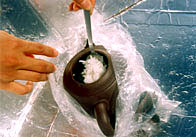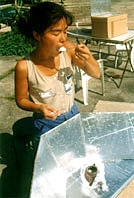
![]()
Search the Journey to Forever website – click HERE
|
Journey to Forever: Make a donation |
Navigation
Contact usTo Keith Addison Handmade Projects |
Solar box cookers
In the modern-city environment, flipping a switch to abundant energy supplies is usually an unconscious act, with little awareness of the critical issues that lie behind it.
- electrical power is generated by fossil fuels
- fossil fuels are a scarce resource, due to run out this century -- estimates vary between 20 years' and 50 years' supply left
- fossil-fuel energy production is highly polluting and increases global warming
- in terms of the Kyoto Protocol on global warming, all countries must reduce their emissions of the greenhouse gases that cause global warming.
Modern city dwellers are privileged: most people do not even have a switch to flip.
Solar box cookers are providing answers and helping people to live better lives and protect their environment in many parts of the world.
Half the inhabitants of Earth cook over woodfires -- 45% of the world's wood is used as fuel. But there's not enough to go round: some 2.4 billion people are now facing shortages of fuelwood.

We cooked rice by the sun in a brown teapot, before we had a black cooking pot. It worked.
Meanwhile deforestation helps cause climate change, floods and soil erosion, increasing environmental degradation, and increasing poverty and hunger.
Woodsmoke from cooking fires is a major source of air-pollution and an outright killer: it causes respiratory infections which kill at least 5 million young children each year.
At the same time millions of people do not have access to clean drinking water, causing widespread disease, especially among children: the WHO says diseases spread through contaminated water cause 80% of the world's illnesses.
There's a simple answer to these problems, that can save millions of trees, provide clean, safe drinking water, doesn't smoke, and that costs just about nothing -- a cardboard box.
Most cardboad boxes end up in the garbage dump. Recycling them saves wood, saves water, prevents pollution and saves a lot of energy.
But, while recycling 60 or so cardboard boxes might save one tree, one solar box cooker can save at least one whole tree all by itself, each year:
Solar box cookers are easy to make -- one cooker designed to be simple enough for 10-year-olds to build without special tools in less than an hour is now helping to feed refugees in Africa (and to save trees).

Using a CookIt solar cooker, with a box cooker on the table behind. There are many types of solar cookers.
Subject areas:
But it's a field that's wide open for innovation and further development. There is as yet no such thing as the ideal solar box cooker. One World Wide Web site lists 56 different designs of solar cookers -- many of them good, but none of them perfect.
This is an area where schools groups can really help to make a breakthrough.
Extensive resources online, schools textbooks and videos available.